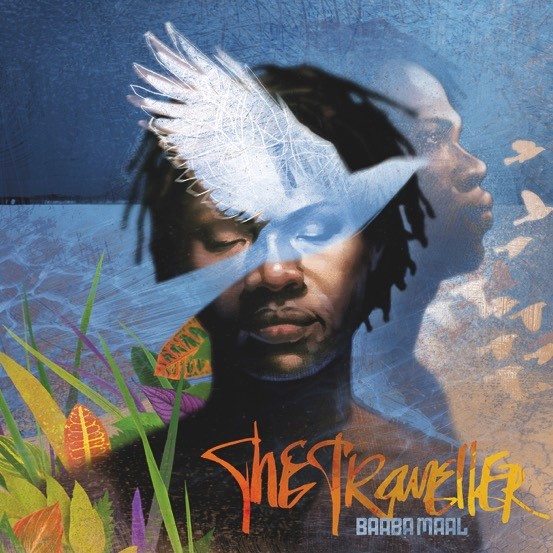After nearly 40 years of diverse music making, Senegal’s Baaba Maal can do whatever he likes. And he does. On his first international release in some seven years, he once again surprises us with an album that is part ambient trance, part roaring desert blues, and part socially engaged rap. Maal likes to work with producers who overlay his songs with a strong aesthetic character, whether it’s Simon Emmerson (Afro Celt Sound System) on 1994’s dance-happy Firin’ in Fouta, or Barry Reynolds and members of Brazilian Girls on 2009’s more songwriterly Television. This time, he joins forces with Swedish producer Johan Hugo of the techno-Afropop act The Very Best and arrives at a sound that is both more contemporary and more mature.
Hugo in the producer’s seat might lead one to expect giddily grooving pop songs, but Maal and Hugo take a more subdued, subtle approach. A shimmering ambient mist of reverb hovers over the entire production, which for the most part makes judicious use of percussion, even rhythm. Many songs begin with little groove at all, or an understated, even implied one. And grooves, when they do come, tend more toward the processional than the dance-inducing. Often, Maal’s lead vocal is unadorned, forefronted before curtains of ambient sound.
The set starts off with a bang as as the anthem-like “Fulani Rock” hits with a dense wall of growling, desert bluesy guitars, driving percussion and layers of Baaba Maal vocals, including a surprisingly appealing Autotuned interlude. But the track's aggressiveness is deceptive, as most of the next six tracks are far more spare and reflective. Some, like “Lambenda” and “Traveller,” cycle through segments of minimal, at times ritualistic, rhythm and more driving grooves. “Traveller” kicks into a dance feel worthy of The Very Best about halfway through, but it doesn’t stay there for long. These are art songs, organic structures that unfold in chapters—something quite different from the folklore of albums like Baayo or Djam Leeli, or indeed the high-concept dance pop of Maal’s recordings with his band Dande Lenöl. But those older strains are not gone altogether. They echo throughout, as in the gentle acoustic vamp and griot-like electric guitar that graces “Kaalajo.”
The songs showcase many sides of Maal’s still-remarkable voice, warm and intimate on “Kaalajo,” full-on thrilling on “Traveller.” “Lambenda” is particularly rich, juxtaposing idiomatic Maal voices, the warm falsetto and the searing gut cry. Here, on the album’s fifth track, we hear for the first time that signature unbridled wail. The song harks back to Maal’s fisherman ancestry with poetry he says he cannot translate into English.
We learn from the sleeve notes that the songs concentrate on peace, tolerance, love—themes with timely resonance as West Africa faces new waves of conflict and turmoil. Maal says, “Language is a weapon,” one he uses not to destroy but to build bridges of understanding. And this brings us to the engaged rap portion of the release. The last two tracks, “War” and “Peace,” feature the spoken words of Lemn Sissay (official poet of the 2012 Olympics). His British-accented words quickly rise to near shouting on “War” with the line “You’re totally stoned on war!” The song begins with solo Fulani flute, but the spoken words come over a rolling djembe and bass drum vamp. The song flows directly into its counterpart, “Peace,” which builds on a kora performance of the Mande classic “Kaira (Peace/Happiness).” Here Maal’s voice reemerges from the reverb-soaked mist while Sissay’s vocal remains foregrounded, much as Maal’s is on earlier tracks. Though well meaning and powerful in their way, these songs feel like quite a departure from the mood of the rest of the album, at first a jarring one. (They are not included in the vinyl version of this release.)
The Traveller is a strong, if imperfect album. Those wedded to the aesthetics of Maal’s early work will likely find in it a mix of pleasures and disappointments. But hats off to Maal for refusing to stand still or repeat himself as many veterans of his stature do. One of Africa’s most gifted singers has always insisted in charting his own course, sojourning with new and old friends along the way, but always moving on—a traveler down to the bone.









